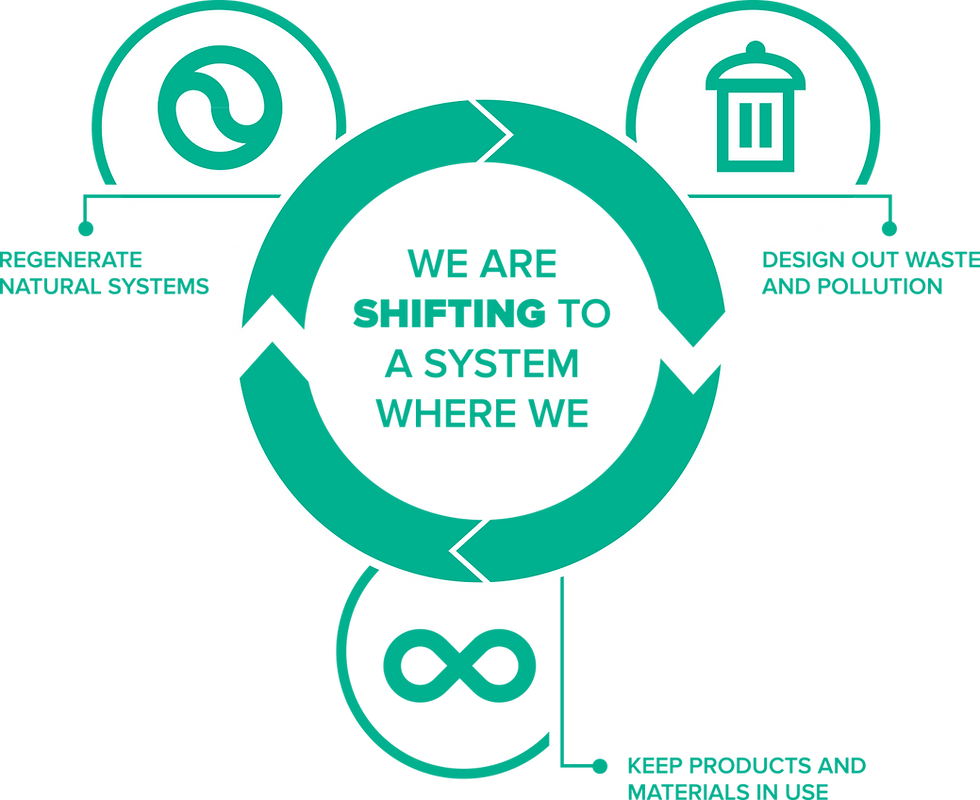The impacts of recycling – both the negatives and the positives – is no secret to everyone. We are very much aware of the benefits recycling offer, but many of us don’t realize the remarkable impacts recycling can do to our economy. Several studies have shown that recycling our waste fuels our economy while also saving our environment.
Ever since the ban of plastic waste imports from several countries in 2017, many countries – including ours – were thrown into a waste crisis, and experts have urged governments to change our ways and shift into a Circular Economy (The Conversation 2019).

(Image from: Ellen Macarthur Foundation)
A Circular Economy, as defined by Active Sustainability, is a “system of resources utilization where reduction, reuse and recycling of elements prevails: minimize waste to a bare minimum and reuse the materials that are not able to return to the environment”.
How does recycling locally improve our Economy?
Encouraging the manufacturing of plastics generates a lot of positive outcomes for our economy. Some are even obvious but our government seem to be turning a blind eye about the perks our economy can benefit if we recycle our plastic onshore.
Job Opportunities: Access Economics did a research back in 2009, Australia where they reported that one of the major benefits of recycling onshore is creating job opportunities. They stated in their research that recycling creates 9.2 jobs per 10,000 tons of waste whereas landfill related work only creates 2.9 jobs per 10,000 tones of waste generated. We all know establishing recycling facilities are expensive, but is it worth it? Yes, it is very much worth it. Recycling adds about an average of $350/tonne of value to our economy. The US is a great example of how recycling creates massive job opportunities.
“We need more action on the ground. We’re really good at collecting the material for councils and businesses et cetera but now we just have to get a lot better at actually reprocessing it and making it into new products” – Jeff Angel, Executive Director of The Total Environment Centre.
Economic revenue: Business Insider Australia (2019) revealed that accounting firm Ernst & Young estimates that currently only $4.2 million worth of recyclable material is captured from our waste each year, if Australia can shift into a circular economy and start treating recyclable materials as a trade-able commodity like gold and iron we can generate up to $328 million worth of recyclable material each year. EY's Climate change and Sustainability Partner, Terence Jeyaretnam stated that Australia must change the way we are sorting our waste as it is not the right fit for 21st century Australia.
Lower Costs: Another huge benefit we get from recycling is Savings (General Kinetics 2019). Manufacturing of goods are cheaper from recycled materials. It also avoids the cost of waste disposal in landfills. Due to lesser landfills, lands can be used for economic use which boosts revenue. Lastly, recycling also stimulates development of recycling equipment. All of these will eventually lead to more savings due to lower cost.
The Bottom line . .
Recycling creates an average of nearly 10x more jobs than trash and Reusing creates as many as 30x more jobs than landfills (Ecocycle Solutions Hub 2019).
To sum it up:
- Recycling conserves natural resources,
- reduces disposal costs & greenhouse gas emissions,
- lowers costs,
- Increases economic revenue
- Strengthens the local economy
Authorities should address our recycling crisis immediately. It is not something to take lightly. Remember that the more trash left unattended in our landfill, the more contaminated and damaged our land will be. We should create an awareness that all the products and packaging we purchase are not without value. They’re resources and many can be reused and recycled. If we implement a better recycling system not only will it benefit our environment but strengthens our local economy and maintains our well-being too.
“When you put the whole picture together. Recycling is the right thing to do”

Comments